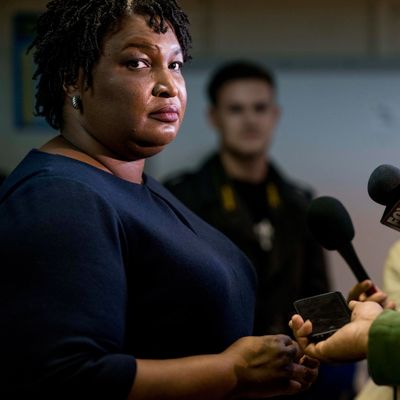
Don’t ask Stacey Abrams to settle for second best. On Wednesday, the Georgia Democrat rejected the prospect of running in the primary as Biden’s vice-president. “You don’t run for second place,” she said on The View. “If I’m going to enter a primary, then I’m going to enter a primary. If I don’t enter a primary, my job is to make certain the best Democrat becomes the nominee and, whoever wins the primary, that we make certain that person gets elected in 2020.” As Yahoo News reports, sources close to Biden had floated the idea of announcing Abrams as vice-president if he launched a campaign, though they seemingly did so without input from Abrams herself. Abrams did not reject the notion of becoming a vice-presidential candidate altogether; in the same View appearance, she said that she would be willing to serve as a nominee’s running mate “once a nominee was set.”
Biden is expected to formally announce his candidacy for the presidency shortly, and he already leads the primary polls. That would make him the front-runner, if or when he announces, but his path to the nomination is littered with obstacles of his own construction. Democratic voters also just elected a historically diverse class of freshman representatives, and may not have much appetite for another white male at the top of the ticket. It’s easy to see what Biden had to gain from running with Abrams from the start.
But it’s less obvious that Abrams ever had much to gain from running as Biden’s vice-president. She’s a rising star in her own right, a trajectory affirmed by her response to President Trump’s State of Union address in January. The first black woman to deliver the Democratic Party’s response to a Republican president, Abrams delivered a speech that not only defined her raison d’être as a national political figure, but also marked out a new direction for her party. She seamlessly linked voting rights to economic justice, and presented a cohesive, compelling vision that would have been Georgia’s reality were it not for voter suppression.
Biden, meanwhile, belongs firmly to the party’s past — and he doesn’t have an inspiring record. He arguably owes his place atop the primary polls to Barack Obama. Before he became vice-president, Biden was known mostly for repeatedly running for president, co-sponsoring an anti-school integration measure in 1975, and badly botching Anita Hill’s sexual-harassment allegations against Clarence Thomas in 1991. Biden, then the chair of the Senate Judiciary Committee, failed to call witnesses that could have corroborated Hill’s account, and allowed Democratic members of the committee to question her harshly about her motivations for coming forward. Nearly 20 years later, the Hill hearing threatens to damage his campaign as soon as he announces it — especially since he seems unwilling to apologize for his role in hindering Hill’s bid for justice. As reported by the Cut, Biden sidestepped responsibility for the Hill hearing at the Biden Courage Awards on Tuesday. Hill, he said, “paid a terrible price. She was abused in the hearing. She was taken advantage of. Her reputation was attacked. I wish I could have done something.”
Biden’s verbal shrug doesn’t just obscure the facts of the Hill hearing. It’s also out of character for him. The former vice-president worked hard to establish himself as a plainspoken, hard-driving politician with a commitment to social justice. His office drafted the Violence Against Women Act three years after the Hill hearing. During the Obama presidency, he advocated publicly for survivors of campus sexual assault and announced a “moon shot” to cure cancer after the untimely death of his son. A moon shot for cancer, but not for Anita Hill; the disparity rankles. And so there is no good reason for Abrams to yoke herself to Biden, at least not right now. She would have surely found herself in the exhausting and unenviable position of apologizing for his legacy and his future gaffes, the likes of which we can only imagine. Abrams hasn’t announce her plans for the future. “I’ll know when I know,” she told New York Magazine’s Rebecca Traister. Whatever shape those plans take, they don’t include playing second fiddle to Joe Biden.






























